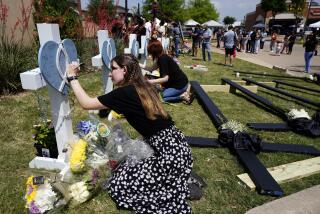A Tight Community Torn Apart
BAGHDAD — The vendors arranged their wares on rickety carts. The shoppers appraised the spices and pottery. In the early morning sunlight, Shiites, Sunni Arabs and Kurds found refuge in this ethnically divided city, sharing the community of a market.
On Wednesday, they died together in a bombing that police said killed at least 24 people in the poor Baghdad neighborhood of Shorja.
Latif Ibrahim, a 35-year-old traffic police officer, later pushed his cap back and wiped his brow. His eyes were filled with tears. He had just returned from a hospital. Falah, the vendor of syrupy lemon drinks, was dead, he said. He shook his head as he recalled Falah’s constant smile and daily offerings of lemon and syrup drinks.
“Don’t ask me who did it,” he said of the attack. “Ask me why.”
For that obvious question, he had no answer.
Ibrahim and a merchant remembered the friends they had made -- Iraqis from every sect and background.
Falah, whose cart lay overturned in the dust, was a Shiite Muslim. On the plastic container holding his drinks, a small sticker bore the picture of militant Shiite cleric Muqtada Sadr. Dried lemons lay next to the cart’s remains.
Arkan, a Shiite vendor of imported Chinese pottery known as farfoori, also was killed in the blast. He was about to be married.
Yasir, a Sunni Arab seller of samoon bread, had ridden his bicycle to the market from his house in the nearby Fadhil neighborhood that morning. The explosion killed him, disfiguring his body. His bicycle lay twisted on the ground.
Three older Shiite women from Sadr City, who sold cardamom and sticks of incense, had been sitting close to the explosion and were incinerated in the blast, several shop owners said.
All that remained of a thriving market was a heap of metal and charred wood.
The blast mixed spices and shards of Chinese pottery, plastic flowers and foodstuff, ashes and blood. It shattered a fraternity of shoppers and vendors who came together to eat sandwiches, haggle or share news in the shade of colorful umbrellas.
The seller of nuts and sweets, Muhsin Salih, 61, lost several friends, among them two brothers, Mohammed and Hassan, who worked at the kebab restaurant with a Kurdish name. Both died of shrapnel injuries, he said.
Salih was talking to shoppers when he heard the explosion. A cloud of dust fell on everything, he said. “I immediately pushed the buyers inside my shop. We were so frightened.”
Another vendor greeted a man, whose left arm was injured. “Hi, Yaqoob,” he called out. “How is Muhsin?”
The two Kurdish brothers, Yaqoob Mohammed Ali, 41, and Muhsin Mohammed Ali, 34, had been hit by shrapnel as they stood by their stall, selling soft drinks and canned food. Yaqoob’s wounds were minor, so he was released from the hospital. Muhsin, whose injuries were more serious, had to stay, Yaqoob said as the roadside vendors began packing up.
Silence fell on Shorja, just hours earlier home to a marketplace full of noise and life. A taxi drove by, carrying a wooden coffin on its roof. A man, smoking a cigarette, sat next to the driver. In the backseat, a woman was crying.
Times staff writer Louise Roug contributed to this report.
More to Read
Sign up for Essential California
The most important California stories and recommendations in your inbox every morning.
You may occasionally receive promotional content from the Los Angeles Times.










